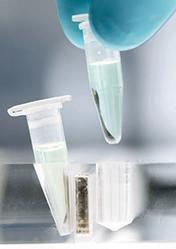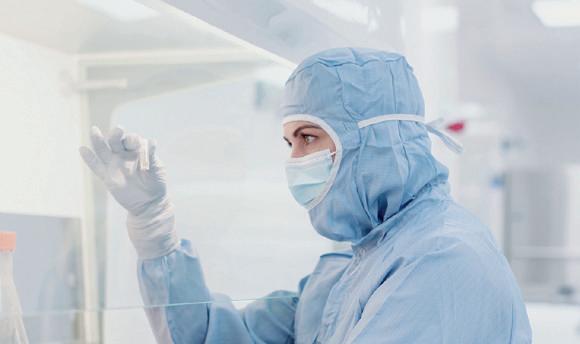

Europea n Biotechnolog y
Science & Industry
Guide
















Let’s save the planet!

Join the European Biotechnology Network!
COVID-19, climate apocalypse, billions of people in turmoil. New strategies are desperately needed. Biotechnology creates confidence and solutions. The European Biotechnology Network is a non-profit organisation that aims to facilitate cooperation between all professionals in biotechnology and life sciences on the European continent. Find out about (free) membership on our website www.european-biotechnology.net
European Biotechnology Network AISBL Avenue Louise 65, Box 11 | 1050 Brussels Belgium | Tel: +32 (0)2 588 70 71 www.european-biotechnology.net info@european-biotechnology.net










Future biotech markets: Europe at a crossroads
European biotech companies continue to demonstrate strong innovative capacity. However, structural and regulatory obstacles in critical areas of innovation have increasingly made it challenging to tap into their full potential. In the future markets of plant breeding/new genomic techniques (NGT), cellular agriculture and digitalisation/clinical trials, in particular, Europe’s bureaucratic processes lag behind the more nimble approaches in Asian countries and the USA. In 2024, the commercialisation of biotech innovations developed in Europe threatens to shift to more modern locations, despite well-intentioned yet poorly implemented EU legislative amendments. The EU Commission is thus failing to achieve its goal of increasing Europe’s resilience and self-sufficiency in key areas of climate protection and the healthcare market. In two areas that are important for the future of European biotech companies, the European Commission has resolutely pushed ahead with regulatory amendments this last year: in deregulating the strict EU genetic engineering law, and, as part of the Pharma Regulation, accelerating the multi-centre clinical trials that previously had to be approved individually by the member states. In a third, young biotech market segment – cellular agriculture – the need for action has at least been identified. However, it is up to the newly elected European Parliament and the new EU Commission to decide which improvements are made.
EU NGT deregulation
In June 2023, after three years of preparation, the EU Commission under President Ursula von der Leyen, who will be in office until the end of 2024, proposed a draft EU regulation aimed at modernising the strict EU genetic engineering law for plant varieties. In light of the rapid development of climate-adapted seeds and the desired reduction in CO 2 emissions and environmental pollution caused by chemical pesticides and fertilisers, the aim is to speed up the approval of breeds designed with cis-genic, new genomic techniques (NGT). Technologies such as targeted CRISPR-Cas directed mutagenesis offer an alternative to achieving results that could, albeit more slowly, be
obtained through traditional breeding techniques like chemical or radiation mutagenesis. The prerequisite for this is the determination of equivalence according to so-called equivalence criteria, which allow up to 20 non-transgenic changes in the plant genome (NGT1 breeds). For the 6% of NGT2 plants in development, which have major non-transgenic modifications, a less bureaucratic approval procedure is to apply, which roughly corresponds to the current EU genetic engineering law. The proposed regulation would be one of the most research-friendly in the world. Unlike in the biotech Mecca of the USA, where genetically modified varieties are deregulated and approved without labelling if only a single trait has been specifically bioengineered, the EU proposal goes further. It allows up to 20 modifications, a move considered by observers to be exceptionally supportive of both research and companies, making it unique worldwide.
Decision imminent
The draft faced criticism from GMO-sceptical NGOs, the European Greens and some member states for its lack of product labeling, absence of co-existence rules to protect organic farming and because it only provides for a simple safety check as part of the variety approval process. These groups are also calling

for a ban on patents, as they believe that patents on seeds would promote seed monopolisation.
Under the Spanish EU Council Presidency, it became apparent that reaching an agreement before the European Parliament (EP) elections in June 2024 would be a close call. In the Council of Ministers, two voting rounds failed to achieve the required qualified majority as the EU member states supporting the draft represented just under 57.6% of the EU population, falling short of the 65% threshold needed. The EP voted in favour of the proposal at the end of early February – albeit with the provison of a ban on patenting and a product labeling requirement for NGT1 breeds. The Commission seemed unwilling to agree to this, particularly the patent ban, at least until midFebruary 2024. Before a second vote by the agriculture ministers, the EU Council had not endorsed the patenting ban. However, by then, 16 EU states, representing just under 60% of the population, agreed. While the seed industry lobby group Euroseeds emphasises that patents for biotechnological inventions, as provided for in EU Directive 98/44, must coexist with the prevailing system of plant variety protection
(breeder’s exemption), the EU biotech association EuropaBio is clearly opposed to sector-specific regulations on patent protection.
Whether an agreement will be reached under the current EU Commission was still open at the end of February. If the Council does not agree on a regulation by then, there will be little time for the EU Commission, the European Parliament and the Council to reach a decision before the new EP elections. As the EU Commission will also be newly elected, it remains to be seen whether the legislative initiative, which promised European plant research access to a market worth billions after decades of stagnation, will be pursued further.
Given that Asian countries and the USA have permitted approvals on a case-by-case basis for several years, closing market access in Europe could hinder academic research by removing incentives to invest in these technologies.
Faster clinical trials
According to leading contract research organisations (CROs), which conduct around 60% of all clinical trials
Fig. 1: Deal volumes in biopharma

Name ›
3PBIOVIAN
Address/P.O. Box › Postal Code/City › Country ›
Manufacturing site Polígono Mocholi, Plaza Cein, 1 31110 Noáin Spain
Address/P.O. Box › Postal Code/City › Country ›
Manufacturing site Tykistökatu 6A, Biocity 20520 Turku Finland
Address/P.O. Box › Postal Code/City › Country ›
Contact Person › Telephone › Email › Website › Social Media › Number of Employees ›
Areas of Activity ›
Commercial office 53 State Street, Suites 503 504 02109 Boston MA (USA)
Elena Erroba (Group Chief Commercial Officer)
+34-948-34-64-80 +35-8-50-3650973 withinus@3pbio.com business@biovian.com www.3pbiovian.com I 550+
| Biotechnology | Biomedicine | CDMO | Biologics | GMP
| Recombinant Proteins | Cell Therapy | Viral Vectors
| Fill & Finish
3PBIOVIAN is a globally operating Contract Development and Manufacturing Organisation (CDMO) formed from the joined forces of 3P Biopharmaceuticals and Biovian.
3PBIOVIAN offers unparalleled end-to-end development and manufacturing services for all protein expression systems and viral vectors, both for Drug Substance and Drug Product, from preclinical to clinical development and commercial phases. Leveraging a joint 40-year track record, expertise, capabilities, and financial strength, the Group positions itself as a leading pan-European independent biologics CDMO, aiming to spearhead the development of drugs tackling patients’ unmet clinical needs.
Our end-to-end service offering spans across multiple platforms (microbial and mammalian expression, adenoviruses, adeno-associated viruses, cell therapy, and plasmids) and offers enhanced production scale flexibility via a diverse range of bioreactor sizes. This comprehensive set of services targets a global base of biopharma clients looking for scientific expertise, premium quality, and outstanding customer service.
GMP certified
3PBIOVIAN offers GMP manufacturing services for microbial and mammalian protein expression platforms, viral vector production for adenoviruses and adeno-associated viruses, cell therapy, and plasmid DNA production.
Summary of services
› Plasmid DNA production
› Cell line development, GMP cell banking and Virus
Seed Stock
› Technology transfer, process development and optimization
› Analytical methods development, qualification, and validation
› Formulation development
› Scale-up and cGMP manufacturing
› Fill and Finish
› Quality Assurance and Quality Control
› DS & DP release




Advanced therapies
› Cell therapy products
› Tissue-engineered products
› Biomaterials (scaffolds or membranes)
› Gene therapy products
GMP
Manufacturing capacities
› Mammalian, single use bioreactors: 50L, 200L, 400L, 2000L
› Microbial, stainless-steel bioreactors: 10L, 100L, 200L, 500L, 1000L
› Viral Vector, single use bioreactors: 10L, 25L, 40L, 200L
› Plasmid DNA, stainless-steel bioreactors: 40L, 200L
Our manufacturing sites
In Turku, Finland, our manufacturing site boasts a workforce of 200 employees and spans an area of 5,100 sqm. Our facilities feature dedicated capacities and capabilities for GMP manufacturing, analytical methods development, quality control services, and fully automated aseptic fill and finish processes.
In Pamplona, Spain, our manufacturing facility employs 350 people and encompasses an expansive area of 10,500 sqm. Here, we house GMP manufacturing capabilities and recently inaugurated state-of-the-art equipment and advanced technology for developing analytical methods and conducting quality control assessments.
Our flexible facilities, certified by EMA and inspected by the FDA, are continually expanding to accommodate the evolving landscape of cutting-edge biopharmaceutical manufacturing requirements.
